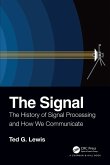Dieser Download kann aus rechtlichen Gründen nur mit Rechnungsadresse in A, B, BG, CY, CZ, D, DK, EW, E, FIN, F, GR, HR, H, IRL, I, LT, L, LR, M, NL, PL, P, R, S, SLO, SK ausgeliefert werden.
Still, this work provides a brief overview of important advanced concepts in approximately historical order and might serve well in advanced courses as a basis for understanding just how much there is to grasp about signal processing."
-- P. L. Kantor, Rockefeller College of Public Affairs & Policy









